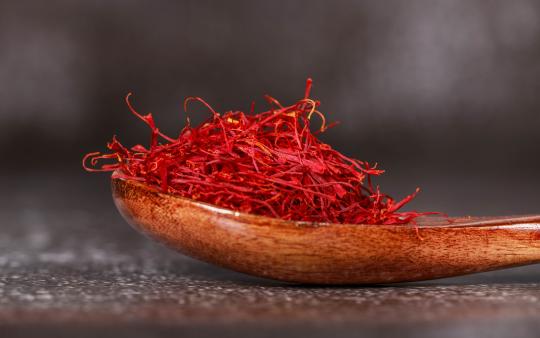Saffron has many benefits outside of cooking. It’s also a supplement with wide-reaching health benefits.
Saffron may have you thinking of pricey, vibrant crimson threads used in cooking. But there’s more to its abilities besides being a gentle spice in some of your favourite dishes. So, what is saffron?
Saffron comes from the saffron crocus and is believed to have originated in the Mediterranean. Today, it’s mostly grown in Iran, Greece, India, and Morocco. In cooking, it’s often used in rice dishes like paella, and it’s still the most expensive spice in the world.1 While this spice has a thousand-year history of medicinal applications in Asia, Western countries have begun adopting it to help with issues related to sleep, mental health, and blood pressure (among other things).2
MENTAL HEALTH
Prescription medications have important roles in our healthcare. However, if you’re looking for a natural approach to anxiety or depression before considering a pharmaceutical intervention, saffron may be a good option to discuss with your healthcare team. In 2016, researchers concluded that 12 weeks of treatment with saffron (50 mg taken twice a day) had a significant improvement in both anxiety and depression, as reported by the study participants. They also concluded that side effects were rare.3 Other studies looking at mental health using lower daily doses of saffron (28 mg daily) also found improvements in mood, anxiety, and stress management.4 A meta-analysis in 2019 further concluded that saffron has a significant effect, in comparison to a placebo, on the severity of depression. Most interestingly, they also found that the effects of saffron were not inferior to those of the selective serotonin reuptake inhibitors (SSRI) antidepressants tested.5 While these studies are encouraging when considering options for treating anxiety and depression, some authors concluded that, while there does appear to be alleviation in depression disorder, saffron alone should not be relied upon to treat this condition.6
SLEEP
Melatonin may be a first-line supplement to target sleep issues, but it’s not the silver-bullet solution for everyone. With sleep and insomnia, it’s important to consider if you’re struggling to fall asleep, stay asleep, or both, and how you feel upon waking in the morning. These details can help your healthcare provider make a recommendation that is best suited to you. Since saffron has been helpful for mental health, researchers decided to look into this spice’s influence on sleep. They found that people struggling with mild to moderate sleep disorders benefited from 15.5 mg of saffron (taken daily, in the evening), when compared to the group receiving a placebo. The supplementation reduced the time to fall asleep and improved sleep quality and duration. This research group also assessed the safety of saffron for sleep support and found that supplementation was well-tolerated, with no serious adverse events.7 Further reviews considered higher doses of saffron (up to 100 mg, taken daily), and it was found to have a more stable and curative effect on participants’ sleep quality.8 We still need more evidence of optimal dosing and long-term safety; but overall, this is exciting news for those who struggle with sleep and seek a non-pharmacological intervention, without risk of dependency or withdrawal symptoms.
“Researchers found that the group taking saffron and completing resistance training had reduced inflammatory markers (on blood testing) and cardiovascular disease risk factors.”

A BLOOD PRESSURE SOLUTION?
Exercise is often recommended for people who are struggling with high blood pressure. The idea that weight training and cardio have benefits for cardiovascular health and disease is well-documented in today’s research. A group of researchers looked at pairing resistance training with saffron to manage inflammation and risk factors in elderly patients with high blood pressure. Over 12 weeks, the participants took 200 mg of saffron daily. Researchers found that the group taking saffron and completing resistance training had reduced inflammatory markers (on blood testing) and cardiovascular disease risk factors.9 Reviews of trials investigating saffron have also concluded that it may significantly improve blood pressure in younger adults, although further research is needed.10 Across the research available, there are conclusions of improved waist circumference, blood sugar management, and cholesterol. Considering its positive effects on blood pressure, this spice may be important in the prevention of heart disease.11,12,13
OTHER EXCITING NEWS FOR SAFFRON
Recently, saffron has also been considered for pediatric uses. In children and adolescents with ADHD, saffron was compared to methylphenidate and demonstrated some comparable benefits; while saffron was more effective in treating hyperactivity symptoms, methylphenidate excelled in treating inattention.14
Anxiety and depression are common mental health symptoms found in patients with cancer. One study of 415 patients found that 58.8 percent self-reported experiencing depression, while 60 percent experienced anxiety.15 For women with breast cancer receiving doxorubicin-based chemotherapy, 30 mg of crocin daily (extract from saffron) significantly decreased anxiety and depression. Interestingly, it was also found that saffron improved hypersensitivity reactions and neurological disorders—difficult side effects that can result from chemotherapy.16
These potential applications for saffron are particularly exciting when considering how to manage mild to moderate mental health concerns and cardiovascular disease. While saffron has a high-safety profile in the trials discussed, it’s important to always check with your healthcare provider before adding any new supplements to make sure it’s safe for you and the best option for your health and goals.
For references visit ecoparent.ca/TWF/SPRING23
You May Also Like: An Herb with Heart: The Benefits of Hawthorn, Inula Helenium for Respiration & Digestion, Why Ginger is Good For You.






